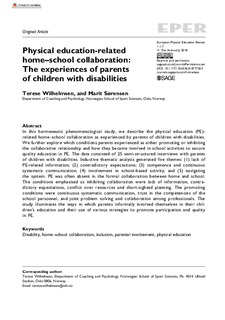| dc.contributor.author | Wilhelmsen, Terese | |
| dc.contributor.author | Sørensen, Marit | |
| dc.date.accessioned | 2019-04-29T10:53:47Z | |
| dc.date.available | 2019-04-29T10:53:47Z | |
| dc.date.created | 2019-03-05T12:38:26Z | |
| dc.date.issued | 2018 | |
| dc.identifier.citation | European Physical Education Review. 2018, under utgivelse. | nb_NO |
| dc.identifier.issn | 1356-336X | |
| dc.identifier.uri | http://hdl.handle.net/11250/2595922 | |
| dc.description | This article is distributed under the terms of the Creative Commons Attribution-NonCommercial 4.0 License (http://www.creativecommons.org/licenses/by-nc/4.0/) which permits non-commercial use, reproduction and distribution of the work without further permission provided the original work is attributed as specified on the SAGE and Open Access pages (https://us.sagepub.com/en-us/nam/open-access-at-sage). | nb_NO |
| dc.description.abstract | In this hermeneutic phenomenological study, we describe the physical education (PE)-related home–school collaboration as experienced by parents of children with disabilities. We further explore which conditions parents experienced as either promoting or inhibiting the collaborative relationship and how they became involved in school activities to secure quality education in PE. The data consisted of 25 semi-structured interviews with parents of children with disabilities. Inductive thematic analysis generated five themes: (1) lack of PE-related information; (2) contradictory expectations; (3) competence and continuous systematic communication; (4) involvement in school-based activity; and (5) navigating the system. PE was often absent in the formal collaboration between home and school. The conditions emphasised as inhibiting collaboration were lack of information, contradictory expectations, conflict over resources and short-sighted planning. The promoting conditions were continuous systematic communication, trust in the competencies of the school personnel, and joint problem solving and collaboration among professionals. The study illuminates the ways in which parents informally involved themselves in their children’s education and their use of various strategies to promote participation and quality in PE. | nb_NO |
| dc.language.iso | eng | nb_NO |
| dc.subject | disability | nb_NO |
| dc.subject | home–school collaboration | nb_NO |
| dc.subject | inclusion | nb_NO |
| dc.subject | parental involvement | nb_NO |
| dc.subject | physical education | nb_NO |
| dc.title | Physical education-related home–school collaboration: The experiences of parents of children with disabilities | nb_NO |
| dc.type | Journal article | nb_NO |
| dc.type | Peer reviewed | nb_NO |
| dc.description.version | publishedVersion | nb_NO |
| dc.rights.holder | © The Author(s) 2018 | nb_NO |
| dc.source.pagenumber | 17 | nb_NO |
| dc.source.journal | European Physical Education Review | nb_NO |
| dc.identifier.doi | 10.1177/1356336X18777263 | |
| dc.identifier.cristin | 1682361 | |
| dc.description.localcode | Seksjon for coaching og psykologi / Department of Coaching and Psychology | nb_NO |
| cristin.unitcode | 150,32,0,0 | |
| cristin.unitname | Seksjon for coaching og psykologi | |
| cristin.ispublished | true | |
| cristin.fulltext | original | |
| cristin.qualitycode | 1 | |
